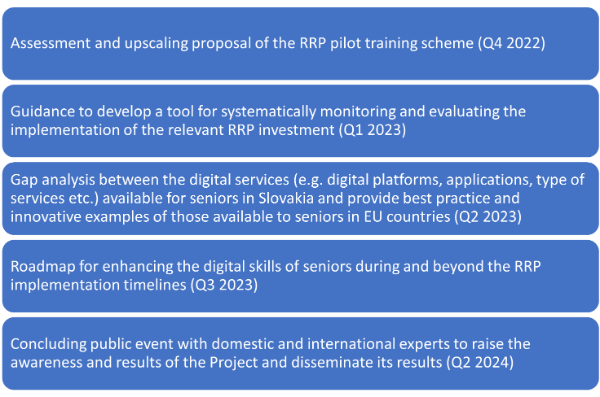Employment policies and data
Enhancing the Digital Skills of Seniors in the Slovak Republic
The Directorate-General for Structural Reform Support (DG REFORM) of the European Commission, the OECD Directorate for Employment, Labour and Social Affairs and the OECD Centre for Skills, are co-operating to provide technical support to Member States through a project funded by the European Union via the Technical Support Instrument.
The project “Enhancing the digital skills of seniors in the Slovak Republic” aims to support the Ministry of Investments, Regional Development and Informatization of the Slovak Republic through (1) assessing the results of a digital training pilot scheme for seniors implemented between May-June 2022; (2) developing upscaling recommendations to train 170,000 seniors and disadvantaged persons in 4 years as foreseen in the Resilience and Recovery Plan (RRP); and (3) providing inputs for enhancing the digital skills of seniors beyond the RRP implementation timelines.
Enhancing the Digital Skills of Seniors in the Slovak Republic Flyer
Context and objectives
In the context of the ongoing digital transformation of the economy and rapid population ageing, there is an urgent need to improve the digital skills of seniors in the Slovak Republic. In the aftermath of the COVID-19 crisis, seniors are left particularly vulnerable as the prerequisites of benefitting from digital goods and services are rapidly moving beyond their current skill set. Slovak seniors are also often isolated, deprived of opportunities for social participation, and faced with discrimination. As the Slovak economy and society become increasingly dependent on digital technologies, the consequences of rapid population ageing, combined with low levels of digital skills of seniors and low participation in adult learning, are likely to become more serious and widespread.
The challenge
The share of elderly in the total Slovak population is projected to grow significantly over the coming years. The demographic old-age dependency ratio (i.e. the number of individuals aged 65 and over per 100 people of working age defined as those at ages 20 to 64) is estimated to increase from 26.5 in 2020, to 54.6 by 2050. Yet, only 11% of seniors aged 65-74 in Slovakia have basic or above basic digital skills, which is significantly below the EU average (24%). Moreover, 27% of seniors aged 65-74 in Slovakia have never used the Internet, and only 39% have used a computer in the last twelve months (below the EU average of 48%).
Project Relevance
The Project is linked to the national reform priorities of the Slovak Republic and will support the implementation of the RRP Component 17 (“Digital Slovakia”), investment 7 (“Improving the digital skills of seniors and distributing Senior-tablets”). It will also be aligned with reform no.6 in the same RRP component (“Strategic approach to education in digital skills in cooperation with key stakeholders”), namely the planned “National strategy for development of digital skills aimed at people in productive and post-productive age”. The Project will also support the implementation of the Strategy of the Slovak Republic for the Digital Transformation of Slovakia 2030 (adopted in 2019) and the Action Plan for the Digital Transformation of Slovakia for 2019-2022 (adopted in 2019). Likewise, the Project will contribute to reaching EU targets of the European Skills Agenda and the EU Digital Education Action Plan 2021-2027, set to ensure that 70% of adults (16-74 years old) have basic digital skills by 2025. Similarly, the Project will contribute to the implementation of the EU 2030 Digital Compass priority according to which 80% of adults should have basic digital skills by 2030. Lastly, the Project will promote lifelong learning opportunities for all (SDG 4) and reducing inequalities based on age (SDG 10).
Project outputs and activities
The project will involve in-depth data and policy analysis, extensive consultations with stakeholders in the Slovak Republic, and peer learning from other countries. These analyses, consultations and peer learning will result in: The project is expected to conclude in May 2024.
|
||
|
|
||
|
Contact: employment.contact@oecd.org |
||
| |
Related Documents

